The United States Armed Forces are the military forces of the United States. The armed forces consist of six service branches: the Army, Marine Corps, Navy, Air Force, Space Force, and Coast Guard. All six armed services are among the eight uniformed services of the United States, along with the U.S. Public Health Service Commissioned Corps and the NOAA Commissioned Officer Corps.

Marine Corps University is a military education university system of the United States Marine Corps. It is part of the Naval University System and accredited by the Commission on Colleges of the Southern Association of Colleges and Schools to award Master's Degrees.
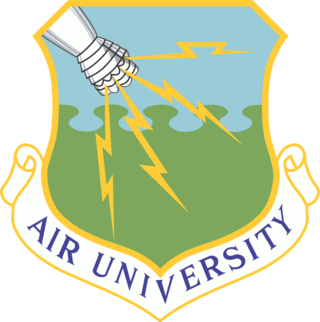
Air University is a professional military education university system of the United States Air Force. It is accredited by the Commission on Colleges of the Southern Association of Colleges and Schools to award master's degrees.
In the United States Marine Corps, a Marine Air–Ground Task Force is the principal organization for all missions across the range of military operations. MAGTFs are a balanced air–ground, combined arms task organization of Marine Corps forces under a single commander that is structured to accomplish a specific mission. The MAGTF was formalized by the publishing of Marine Corps Order 3120.3 in December 1963, "The Marine Corps in the National Defense, MCDP 1-0". It stated:
A Marine air–ground task force with separate air ground headquarters is normally formed for combat operations and training exercises in which substantial combat forces of both Marine aviation and Marine ground units are included in the task organization of participating Marine forces.

The Marine Corps Intelligence is the intelligence arm of the United States Marine Corps (USMC) and an element of the United States Intelligence Community. The Director of Intelligence supervises the Intelligence Department of HQMC and is responsible for policy, plans, programming, budgets, and staff supervision of Intelligence and supporting activities within the U.S. Marine Corps as well as supervising the Marine Corps Intelligence Activity (MCIA). The department supports the Commandant of the Marine Corps (CMC) in his role as a member of the Joint Chiefs of Staff (JCS), represents the service in Joint and Intelligence Community matters, and exercises supervision over the MCIA.
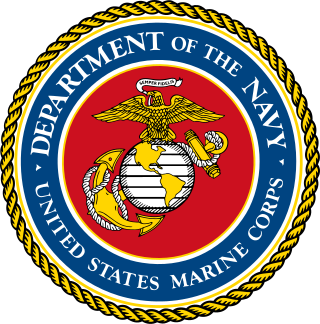
The United States Marine Corps is organized within the Department of the Navy, which is led by the Secretary of the Navy (SECNAV). The most senior Marine commissioned officer is the Commandant of the Marine Corps, responsible for organizing, recruiting, training, and equipping the Marine Corps so that it is ready for operation under the command of the unified combatant commanders. The Marine Corps is organized into four principal subdivisions: Headquarters Marine Corps, the Operating Forces, the Supporting Establishment, and the Marine Forces Reserve.

Command and control is a "set of organizational and technical attributes and processes ... [that] employs human, physical, and information resources to solve problems and accomplish missions" to achieve the goals of an organization or enterprise, according to a 2015 definition by military scientists Marius Vassiliou, David S. Alberts, and Jonathan R. Agre. The term often refers to a military system.

Carl B. Jensen is a retired United States Marine Corps general officer whose last command was Marine Corps Installations East. Jensen retired from active duty on July 22, 2011 after 36 years of service.

Marine expeditionary unit (special operations capable) (MEU(SOC)) is a program created by the United States Marine Corps (USMC) and the United States Navy (USN) in 1985 for Marine expeditionary units (MEU). The program enhances MEUs providing them with additional training and equipment to become certified as special operations capable with a Maritime Special Purpose Force (MSPF). The designation special operations capable is unique to the Marine Corps and means in relation to special operations. The role of a MEU(SOC) however is not equivalent to the special operations role of special operations forces. Although considered special operations capable a MEU(SOC) does not form part of the United States Special Operations Command (USSOCOM) established in 1987 or the United States Marine Forces Special Operations Command (MARSOC) later established in 2006.

Patrick M. Hughes is a retired United States Army officer who served as the 12th Director of the Defense Intelligence Agency (DIA). Previously, he was Director of Intelligence for the US Joint Chiefs of Staff from 1994 to 1996 and the Director of Intelligence at United States Central Command from 1992 to 1994. He was the Commanding General, United States Army Intelligence Agency, and the Assistant Deputy Chief of Staff for Intelligence, U.S. Army from 1990 until 1992. He joined the United States Department of Homeland Security in 2003 as the Assistant Secretary for Information Analysis (Intelligence), and departed from DHS and Government service in March 2005.
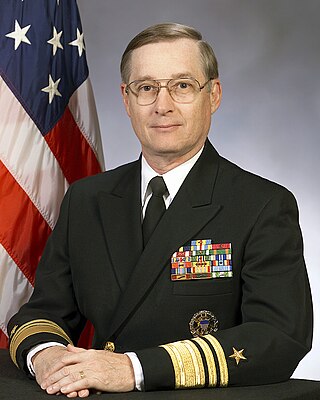
Vice Admiral Lowell Edwin Jacoby, USN was the 14th Director of the Defense Intelligence Agency. Previously he was Director for Intelligence (J-2) Joint Staff in the Office of the Chairman of the Joint Chiefs of Staff from 1999 to 2002, and the Director of Naval Intelligence and Commander, Office of Naval Intelligence from 1997 to 1999. He was the Director for Intelligence, U.S. Pacific Command from 1994 to 1997 and Commander, Joint Intelligence Center, Pacific from 1992 to 1994. He was Assistant Chief of Staff, Intelligence, U.S. Pacific Fleet from 1990 to 1992.

All branches of the United States Armed Forces use the general term Enlisted Professional Military Education (EPME) to describe the formal system of education which each branch provides to its enlisted personnel. Each branch has its own system and sequence of courses, with the overall focus on leadership and management. Education generally increases in intensity and level of knowledge as individuals progress in rank and assume broader leadership roles. EPME is distinct from the technical training which service members receive for their Military Occupational Specialty (MOS), Air Force Specialty Code (AFSC), or Navy Rating.

The U.S. Marine Corps Forces Cyberspace Command is a functional formation of the United States Marine Corps to protect critical infrastructure from cyberattack. Marine Corps Forces Cyberspace Command is the Marine Corps component to U.S. Cyber Command. It comprises a command element, the Marine Corps Cyber Operations Group, and the Marine Corps Cyber Warfare Group, a total of approximately 800 personnel. MARFORCYBER was established on January 21, 2010 under the command of LtGen George J. Flynn,. As of 7 July 2021, MajGen Ryan P. Heritage is in command.
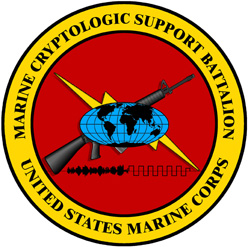
The Marine Cryptologic Support Battalion (MCSB) is a Marine Corps Intelligence battalion of the United States Marine Corps. The battalion headquarters are located in Fort George G. Meade, Maryland.

Vincent Raymond Stewart was a Jamaican-born American lieutenant general in the United States Marine Corps who served as Deputy Commander at United States Cyber Command. He previously served as the 20th Director of the Defense Intelligence Agency (DIA). LtGen Stewart, who held that post from January 23, 2015 through October 3, 2017, was the first African American, first Jamaican American and first Marine to hold the position of Director of the DIA. LtGen Stewart was the 2023 William Oliver Baker Award Recipient presented by the Intelligence and National Security Alliance.
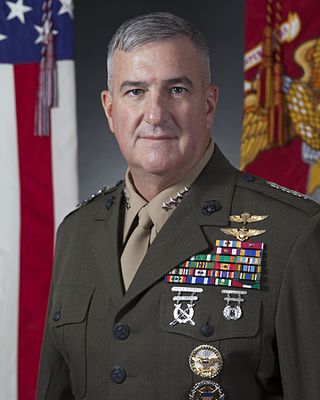
Glenn Michael Walters is a retired United States Marine Corps General, who served as the 34th Assistant Commandant of the Marine Corps from 2016 to 2018. He was appointed as the 20th President of his alma mater, The Citadel, on April 12, 2018.

Russell L. Smith is a United States Navy sailor who served as the 15th Master Chief Petty Officer of the Navy (MCPON). He was acting MCPON from June 22, 2018, when Steven S. Giordano resigned, to August 29, 2018, when he officially assumed the role.

Roger A. Towberman is a retired United States Space Force senior non-commissioned officer who last served as the first chief master sergeant of the Space Force from 2020 to 2023. He also served as the senior enlisted leader of the United States Space Command from 2019 to 2020.





















